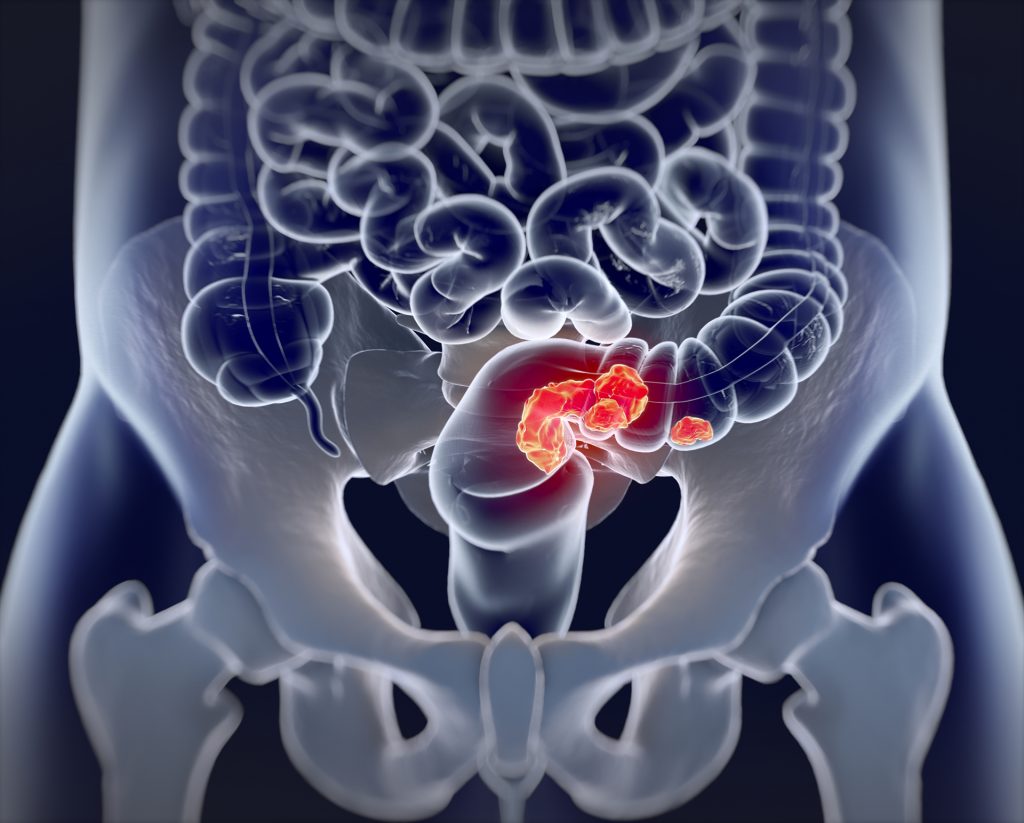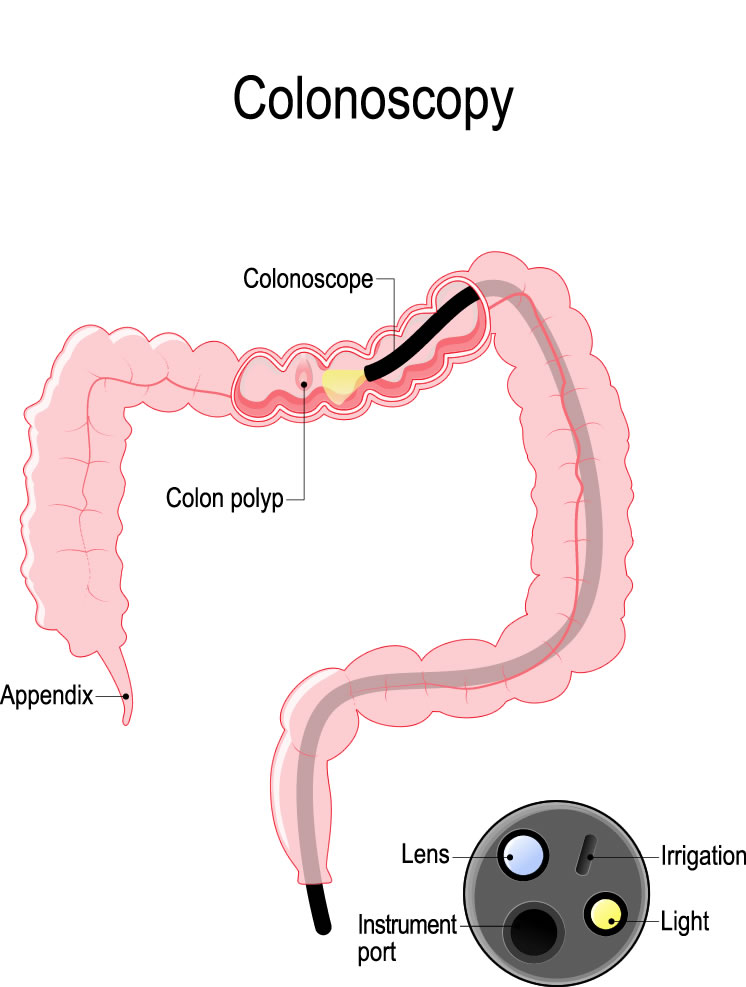Colorectal Cancer Diagnosis and Care in Singapore
Insurance
Our surgery is on the panel of most of the major insurance companies and if you are covered by corporate insurance, you may be entitled to a cashless visit to our clinic.
Get In Touch
Table of Contents
Understanding colorectal cancer

Colorectal cancer, also known as colon cancer, is cancer occurring in the longest part of the large intestine or rectal area. Colorectal cancers usually begin in cells on the inner wall of the colon or rectum that produce mucus and other fluids, forming abnormal growths called polyps. Most of the time, polyps tend to be harmless, however, some of these polyps may turn into malignant tumours that cause cancer.
Through the years, the number of colorectal cases has been increasing in both males and females. Colorectal cancer is the most common cancer affecting males in Singapore, having one of the highest numbers in Asia compared to counterparts like Taiwan and Japan. Unlike other cancers, colorectal cancer has a much higher rate of successful treatment if detected at earlier stages.
Colorectal and Colon Cancer Screening
Colorectal cancer is a significant health concern in Singapore, affecting both men and women, underscoring the need for early detection and timely intervention.
Benefits of Early Screening
Early testing for colorectal and colon cancer provides numerous benefits. One of the primary advantages is the ability to detect cancer in its early stages, often before symptoms appear. This early detection is vital because it allows for more effective and less invasive treatments, significantly improving the prognosis.
Furthermore, screening can identify and remove precancerous polyps, preventing the development of colorectal cancer altogether. Regular screenings can also reduce the need for more extensive and costly treatments, such as colorectal surgery, and help avoid the higher colorectal surgery costs in Singapore associated with advanced stages of cancer. Understanding colonoscopy cost in Singapore is essential for patients looking to manage their healthcare expenses while ensuring they receive quality care.
Who Should Get Screened
Screening for colorectal cancer is recommended for everyone aged 50 and above, as the risk of developing colorectal cancer increases with age. Individuals with a family history of colorectal cancer, polyps, or inflammatory bowel diseases should consider starting screening earlier.
Additionally, those with lifestyle factors that increase the risk, such as a diet high in red and processed meats, smoking, and low physical activity, should also undergo regular screenings. Regular screenings are an essential preventative measure and a critical component of colon cancer treatment in Singapore. They not only facilitate early detection but also help in managing your overall health and reducing the potential burden of colorectal cancer.
By emphasizing the importance of early detection through regular screenings, individuals can take proactive steps to safeguard their health and reduce the risk of colorectal cancer. For those concerned about their digestive health, colonoscopy screening in Singapore is a crucial step in early detection and prevention of serious conditions.
6 Facts About Colorectal Cancer In Singapore
Here are 6 facts you need to know about colorectal cancer, such as its prevalence, symptoms, risk factors, treatment options, as well as how a colonoscopy is important in early detection and treatment.
1. WHY DO I NEED TO KNOW ABOUT COLORECTAL CANCER?
Colorectal cancer is cancer that occurs in the colon (large intestine) or rectum. It mainly affects people above the age of 50.
According to the Singapore Cancer Registry, about 1,500 patients are diagnosed with colorectal cancer in Singapore annually. About 650 patients die from it each year.
In Singapore, colorectal cancer is the:
- No. 1 most common cancer in men (about 1 in 6 of male cancer patients)
- No. 2 leading cause of cancer deaths in men
- No. 2 most common cancer in women (about 1 in 7 of female cancer patients)
- No. 3 leading cause of cancer deaths in women
Hence when both male and female cancers are combined, it is the most common cancer.
2. WHAT CAUSES COLORECTAL CANCER AND WHO ARE AT RISKS?
In most cases, colorectal cancer begins as benign polyps on the inner wall of the colon or rectum that develop into malignant tumours over a period of five to 10 years. The risk of developing colorectal cancer increases if you:
- Have a family history of colorectal cancer
- Are above 50 years old
- Have polyps in your colon or rectum (most are benign but some can develop into cancer)
- Bad lifestyle. (Smoke, or consume a diet that is high in fat, red meat, processed meats and low in fruits and vegetables.)
If any of the above sounds familiar to you, you should schedule a colorectal cancer test.
3. WHAT ARE THE SYMPTOMS?

Although more than half the people diagnosed with colorectal cancer in Singapore have no symptoms, here are some signs to look out for:
- Change in bowel habits (diarrhoea or constipation)
- Blood in your stools
- Persistent abdominal pain
- Feeling of bowel not emptied completely (Tenesmus)
- Constantly feeling full or bloated
- Unexplained weight loss
- Having nausea or vomiting
These symptoms are not specific to cancer and could be caused by other health problems. But if you have these symptoms, do see a doctor to be diagnosed and treated as early as possible. They will be able to confirm your diagnosis, provide treatment options, including colorectal surgery, and advise you about costs. Learn about the early warning signs from someone’s firsthand experience in How I Knew I Had Colon Cancer.
4. CAN COLORECTAL CANCER BE PREVENTED?
Colorectal cancer is entirely preventable via regular colorectal cancer screening in Singapore. It is one of the most powerful weapons for preventing colorectal cancer. Precancerous polyps can be present, often without symptoms, in the colon for years before invasive cancer develops. Colonoscopy can find precancerous polyps so they can be removed before they turn into cancer. Through such tests, colorectal cancer can be prevented.
If you are 50 years old or older, you should go for:
- Faecal Immunochemical Test (FIT) once every year — for detection of hidden blood in the stool. (Diagnostic test only)
- Colonoscopy once every 10 years — for examination of the colon and rectum via a long, lighted tube (colonoscope). This is the Gold standard screening test as it is both diagnostic and therapeutic.
If you have a family or personal history of colorectal cancer, you should:
- Start screening at 50, or 10 years before the youngest family member had colorectal cancer, whichever is earlier.
- Get a colonoscopy done every one to three years.
5. WHAT ARE THE COLORECTAL CANCER TREATMENT OPTIONS?
An important step following the diagnosis of colorectal cancer is to determine its stage.
Cancer stage refers to the spread of cancer in the body. The staging of colon cancer is based on the size of the tumour, whether lymph nodes are involved and whether the cancer has spread to other parts of the body (such as the liver and lungs).
Stage 1 represents the earliest stage of cancer while Stage IV represents the most advanced stage, where the cancer has spread to other parts of the body. Different types of treatment are available for patients with colorectal cancer. Broadly, these treatments are:
- Surgery
- Chemotherapy
- Radiotherapy
- Immunotherapy
The type of treatment recommended will depend on several factors, including the cancer stage and overall health of the patient. In general, Stage 1 and 2 requires colorectal surgery only. Stages 3 and 4 often require surgery in combination with chemotherapy and/or radiotherapy/immunotherapy.
6. HOW DO I LOWER MY RISKS OF COLORECTAL CANCER?

Early detection of precancerous colorectal polyps via timely colorectal screening.
The Gold standard for colorectal cancer testing and screening is colonoscopy which is both diagnostic (detects polyps) and therapeutic (removes the polyps before it progresses to cancer).
Frequently Asked Questions (FAQs)
What are the common symptoms of colorectal cancer?
Colorectal cancer in Singapore commonly presents with symptoms such as persistent abdominal pain, changes in bowel habits (like diarrhoea or constipation), blood in the stool, and unexplained weight loss. It’s important to note that these symptoms are not exclusive to colorectal cancer and may be caused by other conditions. Early detection through regular screenings is crucial for effective management of colorectal cancer.
What are the stages of colorectal cancer?
Colorectal cancer in Singapore is classified into four main stages. Stage I involves cancer limited to the inner layers of the colon or rectum. Stage II extends through the muscle layer but has not spread to lymph nodes. Stage III involves cancer spread to nearby lymph nodes but not to distant organs. Stage IV is the most advanced stage, where cancer has metastasized to distant organs like the liver or lungs. Early-stage detection greatly improves the chances of successful treatment. Learn how medical professionals determine the extent of colon cancer in our article on Colon Cancer Staging.
How long does colorectal cancer treatment typically last?
The duration of colorectal cancer treatment in Singapore varies depending on the stage of cancer and the treatment approach. Early-stage colorectal cancer may require surgery followed by a short recovery period, while advanced stages may involve several months of chemotherapy and radiation therapy. The treatment plan is tailored to the individual patient’s condition and response to therapy.
Can colorectal cancer reoccur after treatment?
Yes, colorectal cancer can recur after treatment. Recurrence is more common in advanced stages of colorectal cancer. Regular follow-ups and monitoring are essential to detect any recurrence early. Patients who have undergone colorectal cancer treatment in Singapore should adhere to their doctor’s recommendations for ongoing surveillance and lifestyle changes to reduce the risk of recurrence.
Can I get an estimate of the colorectal surgery costs before undergoing surgery?
Yes, you can obtain an estimate of the costs for colorectal surgery in Singapore before proceeding with the procedure. It is advisable to discuss the expected costs with your healthcare provider or the hospital’s billing department. They can provide a detailed breakdown of the surgery, hospital stay, and any additional expenses. Understanding the potential colorectal surgery costs in Singapore helps in planning and managing finances effectively. For accurate information regarding the cost of colonoscopy in Singapore, consult our comprehensive guide.
How can patients manage the colorectal surgery cost in Singapore?
Patients in Singapore can manage the costs of colorectal surgery through various means. Health insurance plans often cover a significant portion of the expenses. Additionally, there are government subsidies and financial assistance programs available for eligible patients. Discussing the available options with your healthcare provider and financial counselor can help in effectively managing the cost of colorectal surgery in Singapore.
How reliable are tests for detecting colorectal cancer?
Tests for detecting colorectal cancer, such as colonoscopies and the Faecal Immunochemical Test (FIT), are highly reliable. Colonoscopies are considered the gold standard for colorectal cancer tests as they allow for direct visualisation and removal of polyps. The FIT is also effective in detecting hidden blood in the stool, which can be an early sign of colorectal cancer. Regular testing is crucial for early detection and successful treatment.
Are there any preparations required for a colorectal cancer test?
Yes, preparations are required for most colorectal cancer tests, particularly colonoscopies. Patients need to follow a clear liquid diet and take prescribed laxatives to cleanse the bowel before the test. For the Faecal Immunochemical Test (FIT), minimal preparation is needed, usually just a stool sample collection. Proper preparation ensures accurate results and a successful colorectal cancer test.
How can colon cancer screening save lives?
Colon cancer screening in Singapore can save lives by detecting cancer at an early, more treatable stage. Screening methods like colonoscopies can identify precancerous polyps and allow for their removal before they develop into cancer. Early detection through regular screening significantly increases the chances of successful treatment and reduces mortality rates associated with colon cancer.
What follow-up is necessary after a colon cancer screening test?
After a colon cancer screening test in Singapore, follow-up care depends on the findings. If polyps are detected and removed, your doctor may recommend more frequent screenings to monitor for new growths. If no abnormalities are found, the next screening may be scheduled in 5 to 10 years, depending on your risk factors. Consistent follow-up is crucial for maintaining colon health and preventing cancer development.
What is the role of diet and nutrition in managing colon cancer?
Diet and nutrition play a significant role in managing colon cancer in Singapore. A balanced diet rich in fruits, vegetables, whole grains, and lean proteins supports overall health and aids in recovery during and after treatment. Avoiding red and processed meats, and limiting alcohol intake can also help reduce the risk of cancer recurrence. Nutritional support is an integral part of colon cancer treatment to maintain strength and improve outcomes.
What are the potential complications of colon cancer treatment?
Potential complications of colon cancer treatment in Singapore include side effects from surgery, chemotherapy, and radiation therapy. These may include infection, bowel obstruction, fatigue, and changes in bowel habits. Long-term complications can involve issues like lymphedema or secondary cancers. Managing these complications with the help of a healthcare team is essential for improving the quality of life and achieving the best possible outcomes from colon cancer treatment.
About Dr QM Leong
Colorectal & Hernia Surgeon in Singapore
Dr Leong is a general and colorectal surgeon in Singapore who graduated from the University of London in 2000. He obtained his membership to the Royal College of Surgeons of Edinburgh in 2003 and started working in Tan Tock Seng Hospital in 2003. He started his Advanced Specialist Training in 2005 and passed his fellowship exams in 2008. Dr Leong was awarded the prestigious MOH HMDP scholarship to train under Prof Kim Seon Hahn in Korea University for Laparoscopic and Robotic colorectal surgery in 2010.
Dr Leong is amongst a handful of hernia and colorectal surgeons in Singapore who practice Single Incision Laparoscopic surgery. This is a technical and complex procedure that is minimally invasive, speeds up recovery, and confers excellent cosmetic results. Dr Leong also routinely trains basic and advanced specialist trainees in laparoscopic surgery, and regularly proctors consultant surgeons in complex colorectal cases.
Beyond laparoscopic surgery, Dr Leong also performs a repertoire of minimally invasive General Surgery procedures. He is also an experienced endoscopist with more than 10000 procedures, performing diagnostic and therapeutic scopes for elective and emergency surgical conditions. He performs direct access colonoscopies and oesophago-gastro-duodenoscopy for patients and will strive to perform the procedures on the same day if possible for patients’ convenience.

Insurance
Our surgery is on the panel of most of the major insurance companies and if you are covered by corporate insurance, you may be entitled to a cashless visit to our clinic.
Get In Touch
Corporate Insurance Partners











Personal Insurance Partners







